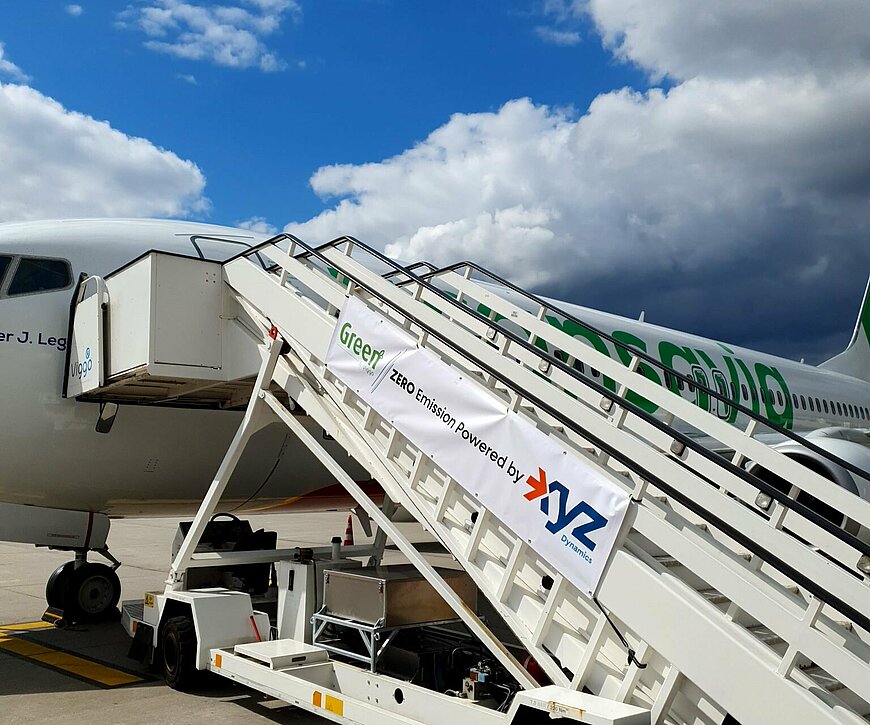How XYZ Dynamics slugged its way through corona times and now focuses on making airports sustainable

Eindhoven-based start-up XYZ Dynamics wants to electrify existing vans. Corona disrupted plans to enter the market, but a new market has since came into view.
A plane journey consumes a lot of energy, and not just the fuel to get the aircraft to take off and fly. It also takes energy to transport luggage to the right place. A staircase that can be relocated allows passengers to board and disembark. And when the plane is on the ground, a water pump truck is there to deal with the lavatory usage. All of these vehicles have diesel engines. That’s what Viggo, the ground handler at Eindhoven Airport (among others) and XYZ Dynamics want to change.
They are doing this by electrifying their vehicles. The two companies have already done this with an aircraft staircase. Viggo‘s ambition is to make its ground handling equipment sustainable by 2023, ZeroEmissionViggo. To that end, the company wants to electrify all ground support equipment (GSE) vehicles that drive around airports.
Conversion
The Dutch start-up XYZ Dynamics based in Eindhoven, which includes two former students from the Eindhoven University of Technology, has developed an electric powertrain for vans. The idea arose during their involvement in the URE student team, an electric racing team, co-founder Alex Pap explains. “My associate and I were actively involved with this team full time. A third associate was co-owner of a garage company that sponsored URE. All three of us wanted to do something about the energy transition ourselves.”
They went looking for that in the area of the commercial vehicle industry. A diesel van can be converted to a hybrid model with a few minor modifications. This is especially useful for inner cities, where diesel is increasingly being banned because of zero-emission zones.
Viggo and XYZ met each other at the end of 2019. “Before the corona crisis, Viggo was capitalizing on the growth of Eindhoven Airport,” says Pap. “They didn’t want to write off the current diesel engines, but to refurbish them. And asked us to help them with that.”
Airplane staircase powered by electricity
Corona threw a spanner in the works. The tender fell through. Pap: “For Viggo, the alternative was either to make it more sustainable or to lay people off.” For Pap, it was only logical that Viggo chose its employees above all else. “We agreed that we would look for a creative solution.” That solution came in the form of a grant, via the MRE, the Metropolitan Region of Eindhoven. “It gave us the opportunity to refurbish an existing diesel staircase.”
The aircraft staircases now run entirely on electricity. An electric powertrain and power source were built into an existing staircase. “That’s much cheaper than buying a completely new one,” says Pap. Because an old staircase was converted, there is hardly any waste. The staircase is not only zero-emission but noiseless as well. “We are now in the process of adding other types of vehicles to our portfolio,” he states.
Nevertheless, XYZ continues to focus primarily on the electrification of vans. Last July, the start-up received the Gerard and Anton Award. In the interview that IO had with Pap, he explained how XYZ can see to it that current diesel-powered vans can become zero-emission. To do this, Pap and his team developed a universal electric powertrain, AxLextric. With this, a vehicle can drive about 50 kilometers electrically. A computer, the GeoLectric, provides an automatic switch from combustion engine to electric motor in the inner cities.
Bridging the gap
Pap sought funding in order to bring the powertrain to market. When that came into view, so did corona. “That investor unfortunately went bankrupt,” he says. Pap cannot say whether the Swiss party went bankrupt because of corona or whether it might have happened anyway. “The fact is that we were also hit by corona.”
In addition to the grant from the MRE stimulus fund, the start-up received funding from Bright Move’s emergency fund. “This allowed us to bridge a difficult period, we were in a position to electrify the staircase with Viigo, and we finally found a logistics company. We are now electrifying a van with a battery exchange system together with that company.”
Pap would like to launch a prototype with that party, “and then move to a scalable product.” “The collaboration is still in its infancy, but I hope we can say more about it soon,” he adds.
“Hopefully the unpredictable time is now behind us,” Pap continues. “We’ve had to let staff go to keep our heads above water.” Support from the region helped bridge that period. “I am most proud of the fact that we as, an organization, have remained motivated and that we can now take some steps forward again.”